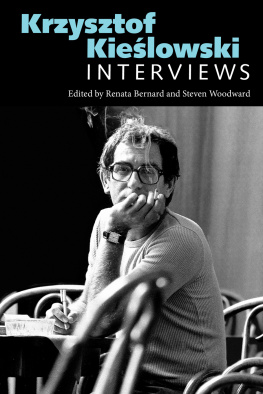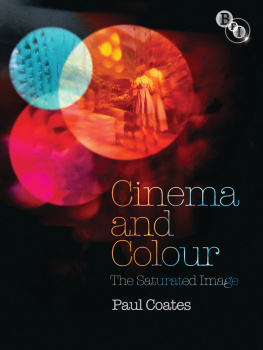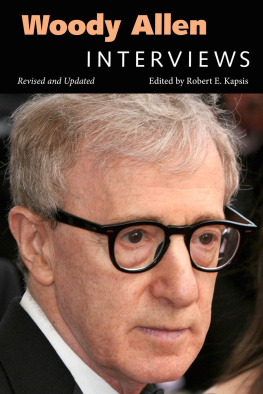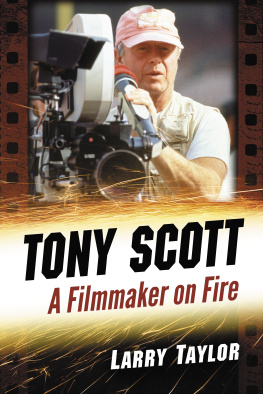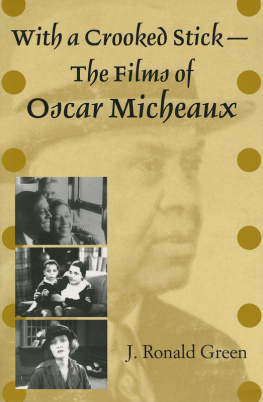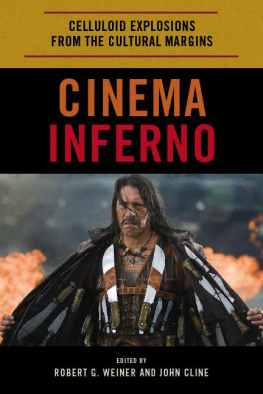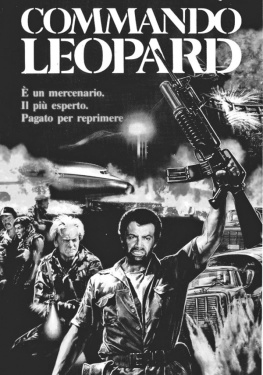
Krzysztof Kielowski: Interviews
Conversations with Filmmakers Series
Gerald Peary, General Editor
Krzysztof Kielowski
INTERVIEWS
Edited by Renata Bernard and Steven Woodward
University Press of Mississippi / Jackson
www.upress.state.ms.us
The University Press of Mississippi is a member of the Association of American University Presses.
Copyright 2016 by University Press of Mississippi
All rights reserved
Manufactured in the United States of America
First printing 2016
Library of Congress Cataloging-in-Publication Data
Kieslowski, Krzysztof, 19411996.
Krzysztof Kieslowski : interviews / edited by Renata Bernard, Steven Woodward.
pages cm. (Conversations with filmmakers series)
Includes bibliographical references and index.
Includes filmography.
ISBN 978-1-62846-213-5 (hardback) ISBN 978-1-62674-574-2 (ebook) 1. Kieslowski, Krzysztof, 19411996Interviews. 2. Motion picture producers and directorsPolandInterviews. I. Bernard, Renata, editor. II. Woodward, Steven, 1964 editor. III. Title.
PN1998.3.K54A3 2015
791.4302'33092dc23
2015031995
British Library Cataloging-in-Publication Data available
Contents
Krzysztof Kielowski / 1968
ski / 1970
pel / 1971
Andrzej Koodyski / 1973
Zygmunt Kauyski and Marian Turski / 1976
Ginette Gervais / 1979
Jacques Demeure / 1980
Krzysztof Kielowski / 1981
Maria Marszaek / 1987
Boena Janicka / 1988
Hubert Niogret / 1988
Antoine Tixeront / 1988
Stanisaw Latek and Marie-Claude Loiselle / 1989
Steve Goldman / 1989
Tadeusz Sobolewski / 1990
Krzysztof Kielowski / 198990
Krzysztof Kielowski / 198990
Krzysztof Kielowski / 198990
Stphane Brisset / 1991
Michel Ciment and Hubert Niogret / 1991
Tadeusz Szczepaski / 1991
Hiroshi Takahashi / 1993
Tadeusz Sobolewski / 1993
Tadeusz Sobolewski / 1993
Tadeusz Sobolewski / 1993
Jonathan Romney / 1993
Tony Rayns / 1994
Katherine Monk / 1994
John Griffin / 1994
Simon Hattenstone / 1994
Kristine McKenna / 1995
Tadeusz Sobolewski / 1995
Paul Coates / 1995
Marek Hendrykowski and Mikoaj Jazdon / 1996
Grayna Torbicka and Tadeusz Sobolewski / 1996
Agata Otrbska and Jacek Bach / 1996
Introduction
The story of Krzysztof Kielowski, at least as it is known outside of Poland, is of a filmmaker rooted in the social documentary and politically engaged cinema of his homeland whose original tendencies, by force of personal, political, and economic changes, became grafted onto the wider cinematic tradition of Europe and the stylistics of the art cinema in the 1980s and 1990s. This book strives to give much greater nuance to that story, to represent Kielowskis hybrid career and oeuvre by mapping his own thoughts and feelings about his work, from 1968, when he was still in film school, to 1996, when the Three Colors trilogy had won him global critical acclaim and yet he had announced his retirement from filmmaking, at the relatively young age of fifty-two.
In tracing this psycho-biographical narrative, our selection of interviews ranges across three different languages. Interviews with Kielowski begin with Polish, expand to French in the late 1970s and 1980s, but only really appear in any number in English in the late 1980s and 1990s, after the international distribution of the Decalogue and the two related theatrical films. This development reflects Kielowskis expanding reputation beyond the borders of what was, until 1989, Eastern Bloc Poland. Kielowski visited North America for the first time in October 1986, for the screening of No End at the New York Film Festival. (Camera Buff had been shown at the Chicago Film Festival in 1980 and Blind Chance in 1987.) However, only after 1991, when The Double Life of Vronique opened the New York Film Festival (and Miramax became involved in the distribution of his films), did U.S. publications take any prolonged interest in him. And even then, he was seldom properly interviewed. Instead, his comments at public screenings and film festivals filled out profiles of the man and reviews of his films. Even Kristine McKennas interview for the LA Times, reproduced here, is focused much more on the man and his beliefs than on the films themselves. This, in short, is one explanation for the rather unusual table of contents of this volume, oriented so heavily towards translations from Polish and French publications.
But there is another reason, too. In seeking interviews for this book, we have carefully considered the merits of interviews in three different languages and their current accessibility. From that perspective, we believe that there is a considerable advantage to publishing translations of interviews that many readers will never have encountered before, even with the apparent accessibility and completeness of information enabled by the Internet. This applies especially to the early interviews in Polish, conducted in the different socio-political reality of Communist Poland, which afford a rare opportunity to trace Kielowskis filmic trajectory back to its beginnings. These interviews also highlight the difficulty of compartmentalization of his work, with interviewers attempts to do so even early in his career refused by the filmmaker himself.
As a result of drawing on interviews in three different languages, we believe we have also traced three different tracks of reception to Kielowskis work, many different registers of engagement, partly owing to significant differences in socio-cultural context. In comparison to English-language interviews, Polish interviews tend to focus on how the films engage with existing Polish discourses on politics, religion, and morality. The Polish interviews reveal the different function of the cinema within Communist Poland where it answered to the dialectical imperative of social betterment central to the social mission of all media. Correspondingly, Polish critics functioned differently in comparison to their Western counterparts, not bound by codes of deference to filmmakers nor fearful of production companies and distributors, but ready to challenge and argue with filmmakers over the morality of their ideas, their engagement with politics, and, occasionally, the aesthetics of their work. Just a quick glance at Boena Janickas 1988 interview with Kielowski, after two of the films of Decalogue had been released, films which to Janicka seem to be disengaged from the urgency of contemporary events and emotionally distant, even while dealing with murder and love, will confirm this. (Interestingly, Janicka focuses on the philosophical and social implications of Kielowskis films, rather than on their particular details.) Kielowski was quite clearly ready to respond in kind to his Polish critics, not only countering with his own appropriately laden defence, but elaborating on themes and techniques that get very little mention in those interviews conducted for English-language publications (see, for example, his elaboration of a notion of a collective consciousnessor perhaps, subconsciousnessthat he describes to Tadeusz Szczepaski, 1991). In short, Kielowski seems to have been intensely aware of both the predilections of his interviewers and the readers of his interviews, and he tailored his responses accordingly.
Perhaps one consistency across all the interviews is Kielowskis reticence to connect explicitly his films to political and personal developments. Nevertheless, because Kielowski lived through a period of social, political, and cultural turbulence in Poland that directly affected his life and work, we have included in our chronology far more detail than is typical for books in this series, especially for the benefit of those readers unfamiliar with that part of Polish history. However, readers may wish to consider just how little of the events mentioned in that chronology are made explicit in the interviews and how the subtextual strategies he developed as a filmmaker in a communist context, which he had in common with other filmmakers of the Eastern Bloc at the time, are carried over to the interviews.
Next page
